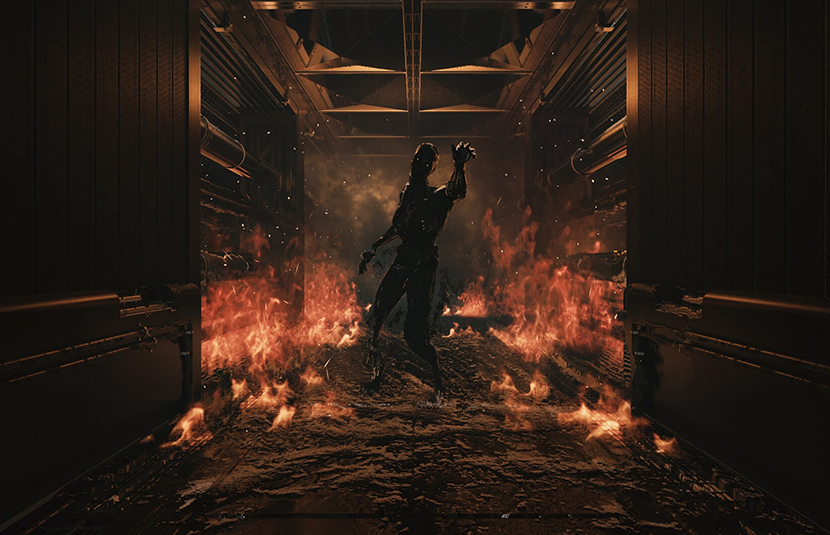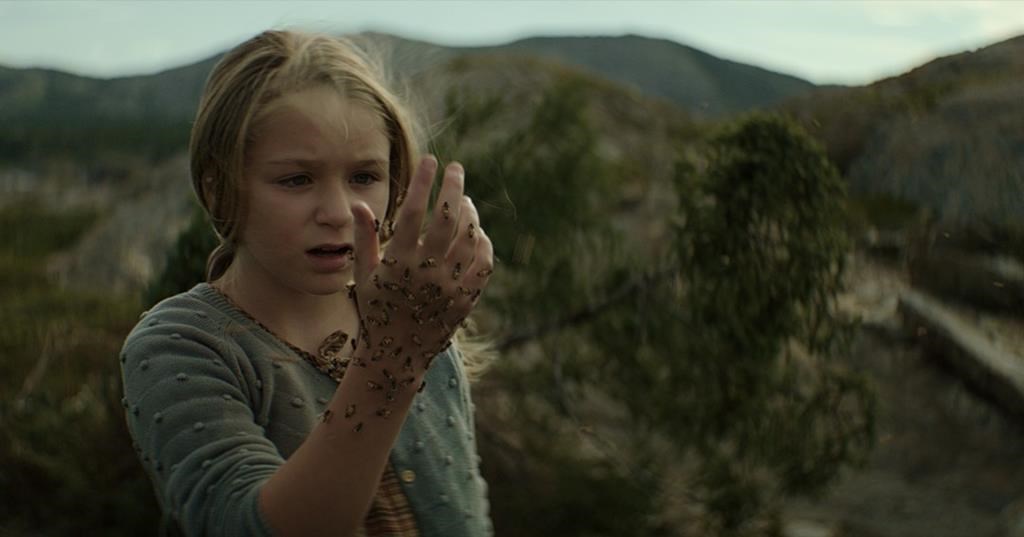Reviews
‘Quantum Error’ Video Game Review – A Frustrating Experience on Almost Every Level

Quantum Error is one of the most baffling games I’ve played this year. On one hand it’s very impressive that a dev team of only four people managed to deliver a game of this scale, on the other it has so many design flaws and technical issues that I found myself wondering if this game was even QA tested. Seriously, Quantum Error is such a frustrating experience from top to bottom that I’m having trouble putting into words how highly I cannot recommend it. Even from a curiosity point of view, Quantum Error is flawed in so many fundamental ways that it’s easily one of the worst games I’ve played this year.
So what is Quantum Error? The game tells the story of Captain Jacob Thomas, a mercenary turned firefighter in the futuristic year of 2109. Society is far more advanced and has an over reliance on the use of Artificial Intelligence for day to day functionality. Certain occupations such as fire fighting and EMT services still require the use of flesh and blood humans. When he and his crew are sent to an offshore facility for a search and rescue, things turn into a fight for their lives as strange happenings begin to unfold.
It’s admittedly a topical premise with the debate over the use of AI vs. the use of humans in various forms of work but it soon crumbles into window dressing to hit all the tropes of the survival horror genre. There was potential to explore real world fears and make a truly chilling experience but as it stands, Quantum Error fumbles this premise hard and does little to stand out from other genre counterparts. The story has weak characters and nonsensical storytelling that proves to be a hindrance to the entire experience and little motivation to see it through to the end.
Gameplay doesn’t get much better as the game’s deeper problems begin to peer out from the tutorials. From the opening mission, the shooting mechanics feels very stiff and unintuitive. At times it felt like I could aim and shoot something and my shot would miss not because of my skill but because of the physics of the game. Everything feels off and almost like the shooting mechanics could’ve spent more time in the oven. The main star of the show gameplay wise is the firefighting side of things that will see players use a variety of tools such as the jaws of life, water hoses, an ax, and various crowbars. Quantum Error is at its most interesting when it’s a firefighter simulator. It’s fascinating to me that there’s never been a game to simulate the real life work of a firefighter such as clearing out a room full of smoke before opening a door to avoid a dangerous backdraft, and carrying out a pedestrian while staying close to the floor.
Quantum Error takes these real life situations and tactics and applies them to a video game with a good degree of faithfulness but none of it is fun to play. It’s not fun to fiddle with Quantum Error’s horrendous menus to find the right tool for the job. It’s not fun to question if I have my gas mask on or am crouching due to the lack of basic UI to convey information to the player. It’s not fun to sit at a station swinging a sledgehammer repeatedly to try and hit a target at a precise angle to progress through the tutorial. None of it is fun nor makes for engaging gameplay.
Things take a turn for the worst when the game remembers that it’s a survival horror game. Over the course of the game Jacob will be put into life or death situations that require him to use stealth and combat; this is the point where Quantum Error falls apart like a tower of Jenga blocks because stealth is straight up broken to the point that every encounter turned into a mad dash to see if I could smack the enemy with a fire ax before they could see me and alert others. I expected Quantum Error to be a cosmic sci-fi horror of some sort but instead what I got was a slasher video game starring me as a crazed lunatic firefighter that would run around chopping heads off as fast as I could.

Visuals are another department where Quantum Error fumbles. The game was one of the first “Next-Generation” horror games announced before the PS5 even came out. Unfortunately the graphics are nothing to write home about and the game often looks like a late PS4 title covered in particle effects to hide all the stiff and lifeless animation and faces. Nothing about this game feels like an evolution. It’s especially funny how in the tutorial the “training” area is nothing but untextured placeholders that are disguised as environmental design. It’s absolutely baffling. While I’m on this point I need to also bring up that the game has zero subtitle options and lacks the ability to turn off a CPR mini-game where you blow into the controller’s microphone. These should be bare minimum accessibility standards and go to show that Quantum Error is lacking in vital functionality.
I do not recommend Quantum Error. It’s a lite firefighter simulator that’s disguised as a survival horror game and is a failure on nearly every level. Yeah it’s impressive that a game of this scale was made by a team of only four people but when you lack basic functionality and UI elements, decently designed encounters, a coherent story, or even some scares, something has gone horribly wrong. Save the 80+ GB hard drive space and avoid Quantum Error.

Review code provided by the publisher.

Reviews
‘The King Tide’: An Island Town Rots with Moral Decay in Canadian Folk Horror Fable [Review]

The opening scenes of director Christian Sparkes’ The King Tide set an ominous tone: a powerful storm takes down the power lines of a small island town as a pregnant woman loses her child while her dementia-suffering mother sits nearby. In the morning, as the town takes stock of the damage and the power is restored, a surprising discovery is found in an overturned boat in the harbour: a baby girl…with the ability to heal.
Writers Albert Shin and William Woods, working from a story by Kevin Coughlin and Ryan Grassby, treat the story as something of a morality tale mixed with a fable. Following the cold open, the action jumps ahead 10 years at a point when the unnamed island (the film was shot in Newfoundland, Canada) is thriving. The fishing is bountiful, the islanders are self-sufficient and have cut ties with the mainland, and most everyone is happy.
As characters are prone to saying, it’s all thanks to Isla (Alix West Lefler), the miracle baby who has grown up worshipped by the islanders. While Mayor Bobby Bentham (Clayne Crawford) and his wife Grace (Lara Jean Chorostecki) endeavor to raise Isla like any other little girl, the reality is that the island’s entire ecosystem revolves around her miraculous powers. It is only because of Isla that they survive; every aspect of their lives – from medicine to food – relies on her.
Each day the citizens line up for their allotted time with the young girl – be it to stave off breast cancer, like Charlotte (Kathryn Greenwood), or recover from another night of heavy drinking like former doctor, Beau (Aden Young). There’s even a predetermined schedule for when she will go out on the boats and use her power to lure fish into the nets.

One fateful day, Bobby succumbs to peer pressure and alters Isla’s schedule at the last minute to accompany cod fishermen Marlon (Michael Greyeyes) and Dillon (Ryan McDonald). A childish game with fatal consequences is played, but with Isla indisposed, a young boy, who would have otherwise been fine, dies. And while the rest of the community grieves, it is Isla who is completely shaken and, unexpectedly, loses her powers.
Suddenly the entire balance of the island is thrown off. Folks like Grace’s mother, Faye (Frances Fisher), who relied on Isla to keep her dementia at bay, suddenly reckon with mortality, while the food security of the town is called into question. Faye’s late-night “support group” meetings take on an urgent and secretive tone and the townspeople claim ownership of Isla’s time despite Bobby and Beau’s protests that she needs rest to recover from her trauma.
Like the best thrillers, the politics and personalities within the community come into play as morals are compromised and the good of individuals vs the collective is played out in increasingly desperate situations. The King Tide excels because it is interested in exploring the competing motivations of the townspeople, while also resolutely refusing to paint anyone as inherently good or bad. These are desperate people, determined to remain independent and free from outside interference, while protecting their trapped-in-amber way of life.

These developments work because there’s a humanity to the characters and The King Tide wisely relies heavily on its deep bench castoff character actors to drive the conflict. Crawford is the de facto protagonist of the ensemble and he’s also the most straightforward character: Bobby is a good man and a loving father, but he’s no white knight. At several points in the film, his willingness to acquiesce to the demands of the community and retain his power causes events to spiral further out of control.
Even more fascinating are Grace and Faye, two commanding women whose capacity for maternal love is matched – or eclipsed – by their own self-interests. A mid-film discovery about Isla’s power reframes Grace’s priorities, ultimately pitting her against her husband. As a result, Grace is incredibly compelling and frustrating (in a good way) and Chorostecki, who has done great genre work on both Hannibal to Chucky, plays the moral ambiguity exactly right. Grace is a fascinating and flawed human character in a film filled with them.
The same goes for Fisher, who deftly balances Faye’s grandmotherly love for Isla with the needs of the community and, by extension, her own health demands. In the hands of a lesser performer, it would be easy to hate Faye for her actions, but Fisher’s performance perfectly captures the fierce determination and fear that drives the island’s matriarch.
Finally, there’s Aden Young, The King Tide’s secret weapon. The ten-year jump reveals that Beau has undergone the most significant transformation: while everyone else has benefitted from Isla’s powers, her presence has eliminated the need for a doctor. With the clinic effectively shuttered, Beau has become an alcoholic; a shell of his former self with no purpose.
Like Bobby, Beau is the easiest character to root for because of his selfless desire to protect Isla, but Young (renowned for his work with Crawford on Rectify) unlocks the character’s tragic pathos and, in the process, becomes the film’s emotional anchor.

Framing the moral decline of the islanders and anticipating the unexpectedly devastating climax is the natural beauty of Newfoundland. As shot by cinematographer Mike McLaughlin, there’s a steely beauty to the geography, resplendent with rocky cliffs, pounding surf, and gusty bluffs that reinforce the islanders’ isolation.
There’s a fierce pride in their struggle to survive independently, evident in the simple lodgings and the antiquated alarm bell that is rung whenever fishing ships from the mainland stray too close. It’s a chilly, atmospheric calling card for one of the most picturesque provinces in Canada, but it is a perfect complement for the folk horror narrative.
Armed with serene, beautiful cinematography, murky moral developments, and a deep bench of talented character actors, The King Tide is a quiet gem that demands to be seen. It’s one of the year’s best genre films.
The King Tide is in theaters April 26, 2024.














You must be logged in to post a comment.